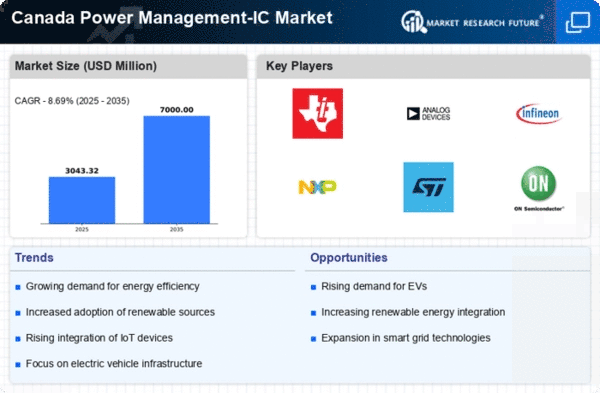Growth of Electric Vehicles
The increasing adoption of electric vehicles (EVs) in Canada serves as a significant driver for the power management-ic market. As the automotive industry shifts towards electrification, the demand for efficient power management solutions becomes critical. In 2025, the number of electric vehicles on Canadian roads is anticipated to exceed 1 million, creating a substantial need for advanced power management-ic technologies to optimize battery performance and energy consumption. This transition not only supports environmental goals but also stimulates innovation within the power management sector. Manufacturers are likely to focus on developing integrated power management solutions that enhance the efficiency and reliability of EVs. Consequently, the power management-ic market may experience robust growth, with projections indicating a potential increase in market size by 15% over the next five years, driven by the electrification of transportation.
Rising Demand for Consumer Electronics
The power management-IC market in Canada is experiencing a surge in demand due to the increasing consumption of consumer electronics.. With the proliferation of smartphones, tablets, and wearable devices, the need for efficient power management solutions becomes paramount. In 2025, the consumer electronics sector is projected to grow by approximately 8.5%, necessitating advanced power management-ic technologies to enhance battery life and performance. This trend indicates a shift towards more energy-efficient devices, compelling manufacturers to invest in innovative power management solutions. As consumers become more environmentally conscious, the demand for products that minimize energy consumption is likely to rise, further propelling the power management-ic market. Consequently, companies that can provide cutting-edge power management solutions tailored to consumer electronics will likely gain a competitive edge in this evolving landscape.
Technological Innovations in Smart Grids
Technological innovations in smart grid systems are poised to drive the power management-ic market in Canada. The implementation of smart grids enhances the efficiency and reliability of electricity distribution, necessitating advanced power management solutions. In 2025, the Canadian government aims to invest over $1 billion in smart grid technology, which is expected to revolutionize the energy sector. This investment will likely lead to the development of sophisticated power management-ic solutions that facilitate real-time monitoring and control of energy consumption. As utilities and consumers alike seek to optimize energy usage, the demand for innovative power management technologies is expected to rise. Consequently, the power management-ic market may experience a growth trajectory of around 12% as stakeholders embrace the benefits of smart grid technologies and their implications for energy management.
Expansion of Renewable Energy Infrastructure
The expansion of renewable energy infrastructure in Canada significantly impacts the power management-ic market. As the country invests in solar, wind, and hydroelectric power, the need for efficient power management solutions becomes increasingly apparent. The integration of renewable energy sources into the grid requires advanced power management-ic technologies to ensure stability and reliability. In 2025, renewable energy is expected to account for over 30% of Canada's total energy generation, necessitating innovative solutions to manage energy distribution effectively. This shift towards renewables not only supports sustainability goals but also creates opportunities for market players to develop specialized power management solutions tailored to the unique challenges of renewable energy integration. As a result, the power management-ic market may witness a growth rate of approximately 10% as companies respond to the evolving energy landscape.
Government Initiatives for Energy Efficiency
Government initiatives in Canada aimed at promoting energy efficiency significantly influence the power management-ic market. Various programs and incentives encourage businesses and consumers to adopt energy-efficient technologies, thereby driving demand for power management solutions. For instance, the Canadian government has set ambitious targets to reduce greenhouse gas emissions by 30% by 2030, which necessitates the implementation of advanced power management-ic technologies across various sectors. This regulatory environment fosters innovation and investment in energy-efficient solutions, creating opportunities for market players. The power management-ic market is expected to benefit from these initiatives, as companies align their product offerings with government standards and consumer expectations for sustainability. As a result, the market may witness a compound annual growth rate (CAGR) of around 7% over the next few years, reflecting the positive impact of these government policies.













